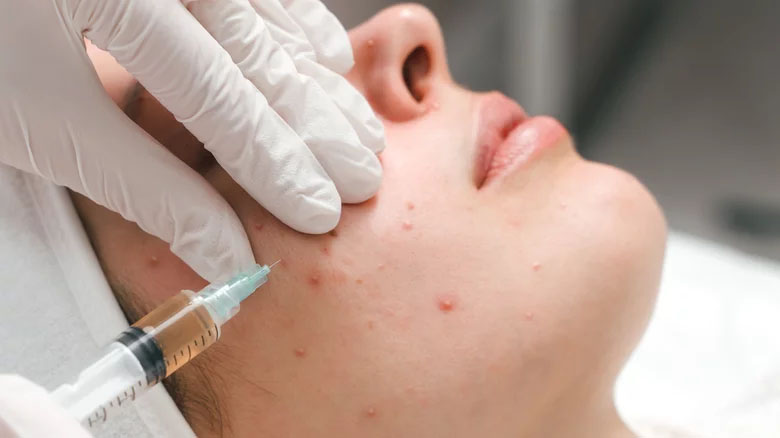If you suffer from joint pain, arthritis, or severe acne, your doctor may recommend using a cortisone injection to relieve your symptoms. Cortisone injections can help to alleviate inflammation and swelling that cause pain, and are often used to treat pain in the back, hips, and knees, according to Mayo Clinic. Verywell Health points out that the shots can even be used to treat cystic acne.
Cortisone injections are comprised of a corticosteroid, which is a type of medication that reduces inflammation and swelling (per Cleveland Clinic). Common types of corticosteroids are methylprednisolone, triamcinolone, and betamethasone. Try saying that three times fast!
Not only do cortisone shots relieve inflammatory joint pain, but they typically take less than five minutes to administer (via Arthritis-Health). That’s a quick procedure for rapid pain relief! While cortisone injections aren’t a magic wand for inflammatory pain, they can certainly ease symptoms.
If you and your doctor decide that a cortisone injection is right for you, here is what you should expect.
The process of getting a cortisone injection
When you get a cortisone injection, you will likely have an appointment with your doctor for an in-office visit (via Dignity Health). Often, patients can drive themselves home after receiving a cortisone injection, but this depends on where you are getting the injection, so this is a topic you should raise with your doctor before your appointment. You may need to arrange to have someone bring you home.
During your appointment, your healthcare provider will apply a disinfectant to sterilize the injection site prior to the cortisone shot, according to Arthritis-Health. Your doctor may then apply numbing lotion or spray or may apply a local anesthetic as part of the injection since many corticosteroids can be safely mixed with local anesthetics within the same solution. The shot may create a pinching or burning sensation, but it shouldn’t be too painful.
Afterward, the doctor will clean and bandage the injection site. The site may be sore and experience some bruising, but pain and inflammation relief should come quickly, though the corticosteroid may take a few days to take full effect (per Healthline).
Side effects of cortisone injections
Mayo Clinic says the potential for side effects can increase with repeated cortisone injections and larger doses of corticosteroids. These side effects can include thinning of the skin, soft tissue, or bone at the injection site; temporary increase in inflammation; temporary blood sugar increase; and lighter discoloration or whitening of the skin at the injection site. If you suffer from arthritis or joint pain, you could experience temporary flaring of your symptoms before the corticosteroid takes effect and provides pain relief.
When it comes to using cortisone shots to reduce the swelling of painful acne, it’s important to note that a cortisone injection won’t clear your skin completely, although it can reduce the inflammation of severe cystic acne and reduce healing time (per Verywell Health). In some cases, the skin at the injection site may experience pitting, depression, discoloration, or thinning. Fortunately, most side effects are temporary.
The number of cortisone injections a person may receive in a year is usually limited because of possible side effects, including the weakening of the immune system (via Cleveland Clinic). For post-care, you can apply ice to the area, but avoid heating pads on the injection site, notes Mayo Clinic. It’s critical to keep the area clean and to follow your doctor’s post-injection advice.



